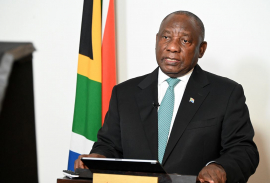
The agricultural sector has the potential to be a key driver on South Africa’s road to economic reconstruction and recovery.
This is according to President Cyril Ramaphosa who was addressing the Annual General Meeting of the Bonsmara Breeders’ Society.
During the last quarter of 2021, the agriculture sector – boosted by increased production of field crops, horticulture and animal products – recorded the strongest growth, surging from at least R114 billion in 2021's third quarter to some R127 billion in the fourth.
“As we saw during the COVID-19 pandemic, agriculture is a resilient sector that was able to sustain food security during times of great uncertainty.
“An important contribution to the fight against hunger was the special social relief of distress grants for unemployed people, and the input vouchers provided to small-scale farmers as part of the Presidential Employment Stimulus,” the President said.
President Ramaphosa acknowledged that although the sector is showing steady signs of improvement, some challenges are still inhibiting its growth.
“We are working to address the challenges of poor road infrastructure, especially rural roads, congestion at our ports, and interruptions to electricity supply. We also need to address water pollution, poor municipal infrastructure in some areas, theft of livestock, and the biosecurity issues that limit export opportunities,” he said.
The President warned that consumers may begin to bear the brunt of increasing production costs.
“High input costs, especially of fertilisers and fuel, are a great cause of concern. There is a risk that rising costs will undermine food security as food prices rise. These challenges are not insurmountable if we work together to resolve them,” President Ramaphosa said.
Diversifying the industry
According to President Ramaphosa, transformation in farming and the development of black farmers remain firmly on government’s agenda.
“Working with the Jobs Fund, the Sernick Developing Farmers Programme has sought to support and mentor developing cattle farmers in the Free State and neighbouring provinces. I understand that emerging farmers receive training for themselves, assistants, quarterly farm visits, working capital, farm plans, infrastructure and full mentorship.
“To give a scale of the undertaking, these farmers have also been supplied with 1750 quality pregnant cows or cows with calves and 50 quality bulls as well as a total of R15 million worth of infrastructure. The biggest task ahead in supporting these emerging farmers is to provide access to markets so that they can become self-sufficient,” he said.
President Ramaphosa said land reform and livestock development in rural areas “where the majority of emerging farmers are” based, is an area where both government and the sector must find ways cooperate.
“The report of the Land Reform Panel provides guidance on what we need to do to drive land reform within the current legislative framework. These include creating innovative financing mechanisms, creating a land register to house donations, releasing state land, conducting a land audit and subdividing land already acquired by the State.
“We are working to provide tenure grants for individual occupiers, root out corruption, re-allocate water rights in conjunction with land allocation, and finalise outstanding restitution and labour tenant claims,” he said. – SAnews.gov.za


